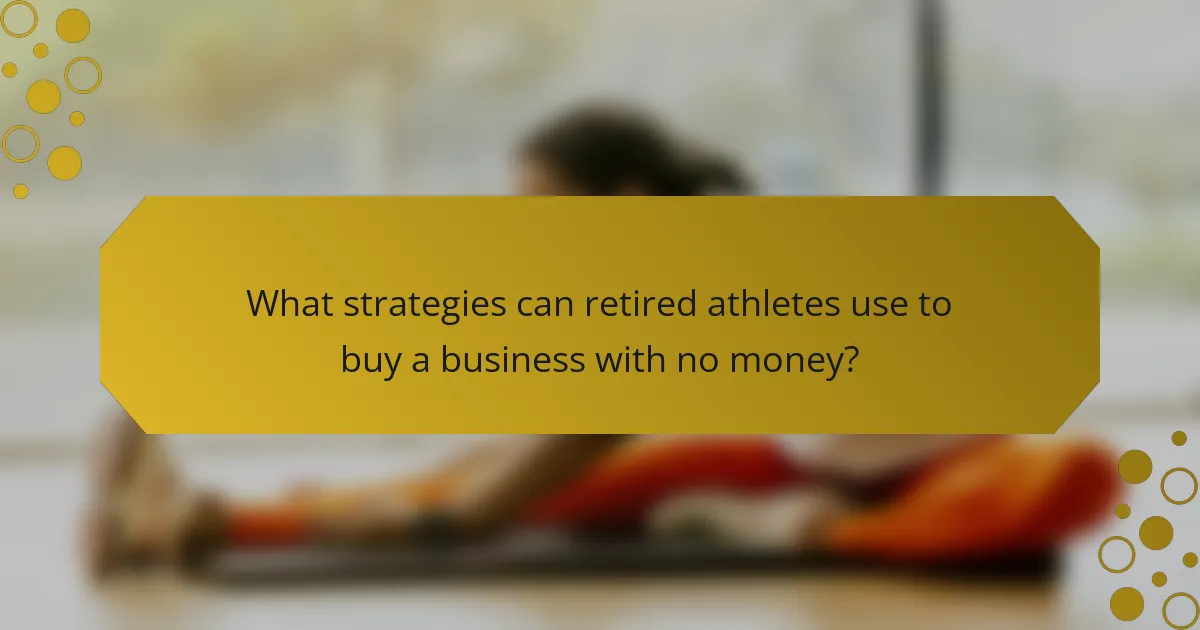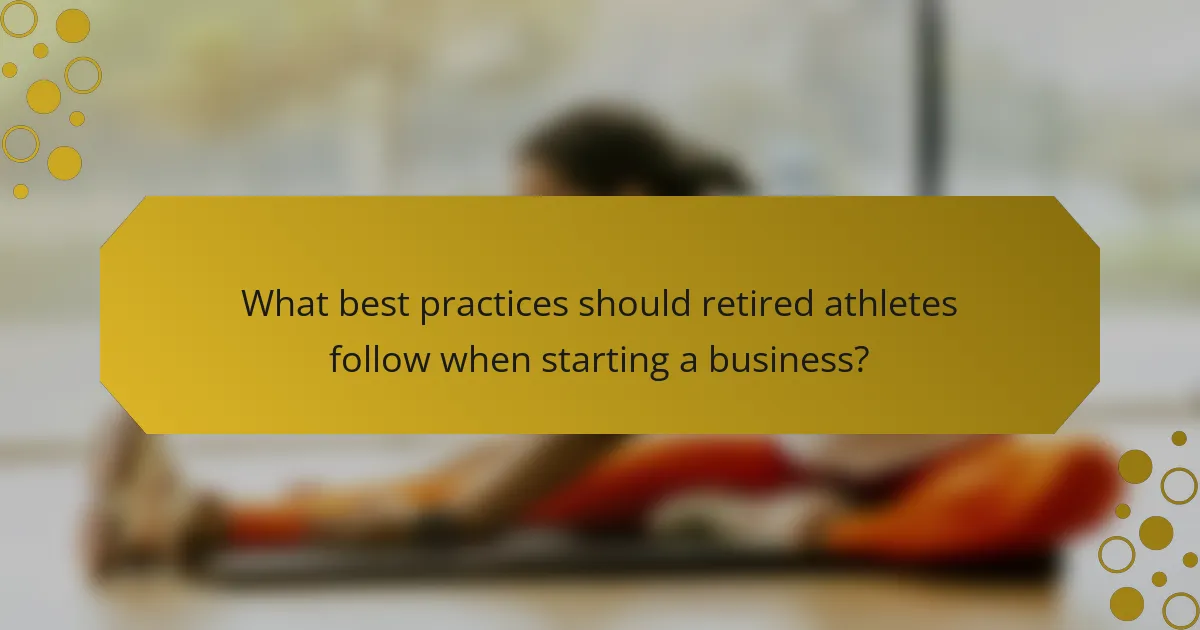Retired athletes often seek business ownership for personal fulfillment and financial security. This guide explores leveraging unique skills and networks, creative financing options, and overcoming challenges in the transition to entrepreneurship. Discover how to build a brand, access resources, and navigate the business landscape effectively.

What are the key motivations for retired athletes to buy a business?
Retired athletes often seek to buy a business for personal fulfillment, financial security, and leveraging their brand. Many desire to stay active post-career, using their competitive skills in new ventures. Additionally, they may want to invest their savings wisely, ensuring long-term stability. The unique attribute of their athletic background can provide a rare advantage in branding and marketing, attracting customers who admire their achievements.
How does entrepreneurship contribute to personal fulfillment after sports?
Entrepreneurship can significantly enhance personal fulfillment for retired athletes by providing a new purpose and engagement. Transitioning from sports to business allows athletes to leverage their unique skills and experiences in a meaningful way.
Retired athletes often seek fulfillment after their sports careers, and entrepreneurship offers a platform for autonomy and creativity. They can pursue passions, create jobs, and contribute to their communities. This shift can lead to a renewed sense of identity and achievement, similar to what they experienced in sports.
Starting a business with no money is possible through strategies like leveraging skills, networking, and seeking partnerships. Many retired athletes find success by using their brand to attract investors or by starting small ventures that require minimal initial investment. This approach aligns with their competitive spirit and drive for success.
In summary, entrepreneurship serves as a powerful avenue for retired athletes to find personal fulfillment, allowing them to redefine success beyond their sports careers.
What mental health benefits can arise from engaging in business ventures?
Engaging in business ventures can significantly enhance mental health by fostering a sense of purpose and achievement. This involvement can lead to increased self-esteem, improved social connections, and a structured routine, all of which contribute to emotional well-being. Additionally, the challenge of entrepreneurship can stimulate cognitive function, providing a rewarding outlet for creativity and problem-solving. As a result, retired athletes may find fulfillment and satisfaction in this new phase of life, positively impacting their overall mental health.

What strategies can retired athletes use to buy a business with no money?
Retired athletes can buy a business with no money by leveraging their unique skills, networks, and experience. They can explore partnerships, seek investors, or utilize creative financing options like seller financing or earnouts. Collaborating with other entrepreneurs can also provide access to capital and resources.
What are the most effective financing options available?
The most effective financing options for buying a business with no money include seller financing, partnerships, and leveraging assets. Seller financing allows the buyer to pay the seller over time, reducing upfront costs. Partnerships can provide shared investment and operational responsibilities. Leveraging assets involves using existing resources to secure loans or attract investors. These methods enable retired athletes to pursue business ventures while minimizing financial risk.
How can leveraging partnerships help in acquiring a business?
Leveraging partnerships can significantly enhance business acquisition opportunities without upfront capital. Collaborating with established entities can provide access to resources, expertise, and networks crucial for successful transactions. Partnerships can also share risks and responsibilities, making the acquisition process more manageable. Additionally, aligning with partners who have complementary strengths can create a compelling value proposition, attracting potential sellers.
What role does seller financing play in business acquisitions?
Seller financing provides a flexible option for business acquisitions, enabling buyers to secure financing directly from the seller. This arrangement can facilitate transactions without requiring substantial upfront capital, making it particularly appealing for retired athletes seeking to invest in businesses. By negotiating terms directly with the seller, buyers can often achieve favorable conditions, such as lower interest rates or extended repayment periods. This unique attribute of seller financing can enhance the overall feasibility of acquiring a business with limited funds. Additionally, it fosters a partnership mindset, as both parties are invested in the success of the business.
What creative approaches can be taken to find zero-cost business opportunities?
Leverage networking, partnerships, and creative financing to discover zero-cost business opportunities. Retired athletes can utilize their connections and personal brand to negotiate equity partnerships or seek sponsorships. Collaborating with local businesses for joint ventures can also minimize costs. Additionally, consider bartering skills or services in exchange for business resources. Exploring grant opportunities specifically for retired athletes can provide funding without upfront costs.

What unique challenges do retired athletes face in business ownership?
Retired athletes face unique challenges in business ownership, including lack of experience, identity transition, and networking difficulties. Many struggle to leverage their sports fame into business success.
Transitioning from a competitive environment to business can be daunting. Athletes often lack formal training in management, finance, or marketing. This gap can hinder their ability to make informed decisions.
Networking is another challenge. While athletes may have strong connections in sports, these do not always translate to the business world. Building a new network requires time and effort, which can be overwhelming.
Additionally, the pressure to succeed can be intense. Athletes are accustomed to winning, and the fear of failure in business can lead to stress and anxiety. This pressure can cloud judgment and impact decision-making.
How does the transition from athlete to entrepreneur affect mental health?
Transitioning from athlete to entrepreneur can significantly impact mental health due to the shift in identity and daily structure. Athletes often face a loss of purpose after retirement, leading to feelings of isolation and anxiety. Engaging in entrepreneurship can provide a new sense of purpose and fulfillment, but it also introduces stressors like financial uncertainty and decision-making pressures.
Studies show that retired athletes who find meaningful work report improved mental well-being. The unique attribute of leveraging athletic discipline and teamwork can enhance entrepreneurial success, fostering resilience and adaptability. However, it’s crucial for these individuals to seek support during this transition to mitigate potential mental health challenges.
What are common pitfalls retired athletes encounter when starting a business?
Retired athletes often face several common pitfalls when starting a business. Lack of industry knowledge can lead to poor decision-making. Emotional attachment to past success may skew realistic assessments of new ventures. Overconfidence can result in underestimating challenges, while insufficient networking can limit opportunities. Additionally, financial mismanagement often arises from inexperience in budgeting and forecasting. Understanding these pitfalls is crucial for a successful transition into entrepreneurship.

What resources are available for retired athletes seeking business guidance?
Retired athletes can access various resources for business guidance, including mentorship programs, online courses, and networking events. Organizations like the Professional Athletes Foundation offer tailored support. Additionally, local small business development centers provide free consultations. Engaging with fellow retired athletes who have transitioned into business can also offer valuable insights.
What professional networks and organizations can assist in this journey?
Professional networks and organizations that can assist retired athletes in buying a business with no money include the National Association of Small Business Owners, SCORE, and the Small Business Administration. These entities provide resources, mentorship, and funding options tailored for aspiring entrepreneurs. Networking with fellow athletes who have transitioned into business can also offer valuable insights and support. Engaging with local chambers of commerce can further enhance connections and opportunities in the business community.
How can mentorship programs benefit retired athletes in business?
Mentorship programs can significantly benefit retired athletes in business by providing guidance and networking opportunities. These programs connect retired athletes with experienced business professionals who can share valuable insights and strategies. This support helps athletes transition their skills from sports to business effectively. Additionally, mentorship fosters confidence and accountability, essential for navigating new business challenges. Retired athletes often possess unique attributes like discipline and teamwork, which mentorship can further refine for business success.

What are the long-term benefits of owning a business for retired athletes?
Owning a business can provide retired athletes with long-term benefits such as financial security, personal fulfillment, and a sense of purpose. Financially, it offers the potential for passive income, which can supplement retirement savings. This transition allows athletes to leverage their competitive spirit and discipline in a new arena, fostering personal growth. Additionally, owning a business can enhance community engagement, as retired athletes often become role models and mentors. Overall, entrepreneurship can lead to a rewarding second career that aligns with their passions and skills.
How does business ownership influence identity and self-worth post-career?
Business ownership significantly enhances identity and self-worth for retired athletes by fostering a sense of purpose and achievement. Engaging in entrepreneurship allows them to leverage their skills and experiences while creating new opportunities for personal growth. This transition can lead to increased self-esteem as they navigate the challenges of running a business. Furthermore, the social connections formed through business networks can reinforce their identity beyond sports, providing a supportive community that values their contributions. Ultimately, owning a business empowers retired athletes to redefine their legacy and maintain a positive self-image.
What are the financial advantages of entrepreneurship for retired athletes?
Retired athletes can achieve significant financial advantages through entrepreneurship, including potential income diversification and personal fulfillment. Starting a business allows them to leverage their unique brand and network, leading to lucrative opportunities. Additionally, entrepreneurship can provide tax benefits, such as deductions for business expenses. Engaging in business activities fosters a sense of purpose, which is crucial for mental well-being post-retirement. Ultimately, successful ventures can create lasting wealth and financial independence, enhancing their quality of life.

What best practices should retired athletes follow when starting a business?
Retired athletes should focus on leveraging their unique skills and networks when starting a business without money. Building a strong brand based on personal experience and credibility can attract partnerships and investors. Networking with former teammates and industry contacts can provide valuable insights and opportunities. Consider starting a business that aligns with personal passions, as this can enhance motivation and commitment. Additionally, exploring creative financing options, such as sweat equity or profit-sharing agreements, can help mitigate initial financial barriers.
What common mistakes should be avoided in the early stages of business ownership?
New business owners should avoid common mistakes that can hinder success. Key errors include underestimating startup costs, neglecting market research, and failing to create a solid business plan.
1. Underestimating startup costs can lead to cash flow issues, making it essential to budget accurately.
2. Neglecting market research can result in poor product-market fit, which is critical for attracting customers.
3. Failing to create a solid business plan may lead to a lack of direction, making it difficult to measure progress and secure funding.
By addressing these mistakes early, retired athletes can successfully transition into business ownership and find fulfillment.
How can retired athletes maintain their mental health while managing a business?
Retired athletes can maintain mental health while managing a business by establishing a supportive network. Engaging with fellow retirees and mental health professionals fosters resilience. Setting realistic goals and maintaining a balanced schedule reduces stress. Regular physical activity, a common practice among athletes, further enhances mental well-being. Additionally, seeking fulfillment through passion projects can provide a sense of purpose and satisfaction.
What strategies can be implemented to ensure sustainable growth and fulfillment?
To ensure sustainable growth and fulfillment, retired athletes can implement strategies such as leveraging their network, seeking mentorship, and exploring low-cost business models. Building a strong support system and focusing on passion-driven projects can enhance motivation and success. Additionally, continuous learning and adapting to market trends are vital for long-term viability. Prioritising community engagement can foster loyalty and brand recognition, which are essential for sustainable business growth.
